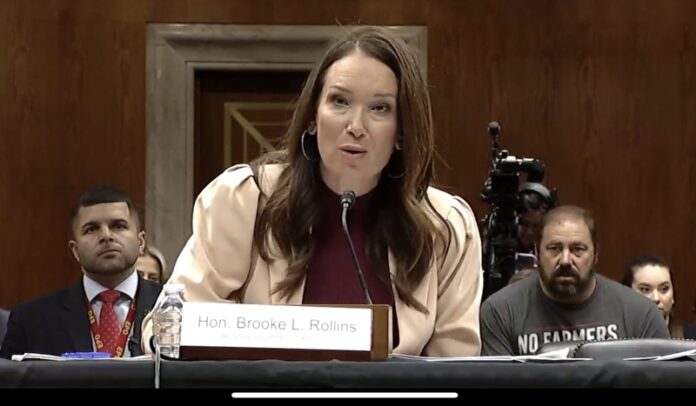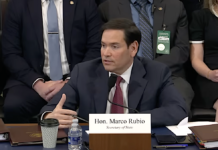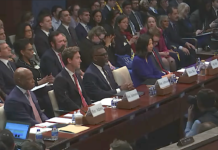
WASHINGTON (States Newsroom) — Agriculture Secretary Brooke Rollins announced during a congressional hearing Tuesday the department will soon detail which staff positions it plans to move away from the nation’s capital and where in the country those jobs will be relocated.
“We have to move,” Rollins said. “This is a customer service oriented agency. And why do we have so many people in Washington, D.C.? And then you bring the forest part into that and then the nutrition into that and it just doesn’t make as much sense.”
Rollins’ comments about restructuring the 100,000-employee department came in the middle of a Senate Agriculture Appropriations Subcommittee hearing on the U.S. Department of Agriculture’s budget request for the upcoming fiscal year.
Republicans and Democrats on the panel used the opportunity to question Rollins about USDA freezing billions in funding approved by Congress, some of which has yet to be released.
Maine Republican Sen. Susan Collins, chairwoman of the full Appropriations Committee, said she’s heard from several “constituents who have received grant award letters from USDA in the previous administration, only to receive letters from USDA informing them that their grant funding is frozen.”
Agriculture Appropriations Subcommittee ranking member Jeanne Shaheen, D-N.H., urged Rollins to “ensure that funding goes to the small farms” and that it be released quickly.
Rollins testified USDA originally froze about $20 billion in federal funds and is still reviewing $5 billion to decide if the department should spend the money as planned.
“Some of the funding that we have pulled back and then reopened, we’ve asked for re-applications to realign around this president’s priorities, which, of course, not surprisingly, is not diversity, equity and inclusion, or some climate programs. But instead to reapply where the farmer or rancher would receive 65% of the funding or more,” she said.
“That’s another piece of this as well,” Rollins added. “So we again, are going line by line. We’re working around the clock. And believe me, we are on it.”
Local food programs funding
Several Democratic senators on the panel — including Wisconsin’s Tammy Baldwin, New Mexico’s Martin Heinrich and Georgia’s Jon Ossoff — pressed Rollins to restore funding for the local food purchasing assistance and local food for schools programs.
“They may be COVID programs, but they’re two of the best examples of using American-grown produce to produce healthier outcomes in our students. To me, that is Making America Healthy Again,” Heinrich said, referencing an often-used Trump administration slogan. “You canceled both of those contracts, even though those contracts were signed and farmers had bought supplies for planting based on those contracts. So what would you say to both the producers and the schools who made financial decisions based on those commitments?”
Rollins said the two programs were “never meant to last forever” and that nearly every state has asked USDA for contract extensions, since they haven’t been able to spend all of the money the federal government sent them.
“Do you know USDA spends $400 million a day on nutrition and food programs? Just USDA. That’s aside from this food bank,” Rollins said. “There is plenty of money in the system. We just have to be better about how we’re spending it. So I hear you, but I think that it’s important to look at where this money is sitting, how it is being spent, and making sure that we’re using the taxpayer dollars effectively.”
The Trump administration’s budget request, released Friday, asks Congress to cut Agriculture Department discretionary funding by $5 billion, or 18.3%.
The proposal suggests lawmakers bolster funding for the Food Safety Inspection Service by $15 billion and for rental assistance grants by $74 billion, though it requests funding cuts on about a dozen programs.
The Agricultural Research Service, rural development programs, Farm Service Agency and National Forest System Management would all see funding cuts if Congress goes along with the budget request.
Rollins said during the hearing the proposed Agricultural Research Service funding cuts, if approved by lawmakers, would decrease that account from $2.1 billion to $1.9 billion.
“So while it is a cut, it’s not a massive cut, it’s a 7% cut. And it’s very much focused on outdated facilities,” Rollins said. “So as we continue the high priority and the focus on the important research, I believe that none of that will be compromised.”
Coming home to Kansas
Kansas Republican Sen. Jerry Moran asked Rollins about proposed funding cuts to the Farm Service Agency and the Natural Resources Conservation Service, saying the programs are important to his home state.
“It was particularly troublesome when those on probation were eliminated,” Moran said, referring to mass firings of new and newly promoted federal workers. “We love the circumstance when a young man or woman out of college returns home, goes to work for USDA in a county office. We do not have sufficient personnel in those county offices today. But we particularly love when they are somebody who’s in their 20s, they come home and they raise a family in a small county of Kansas.”
Rollins responded that FSA is of “paramount importance.”
Congress will debate the dozen annual appropriations bills, including the Agriculture spending measure, in the months ahead.
Lawmakers are supposed to negotiate agreement on all of the government funding bills before the start of the new fiscal year on Oct. 1. But they will likely use a stopgap spending bill to give themselves until mid-December to work out bipartisan, bicameral agreements.






